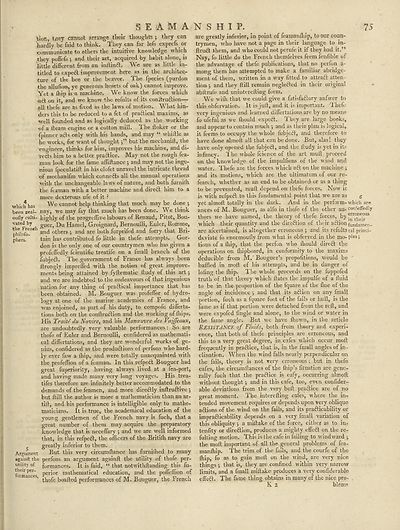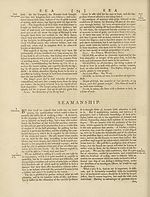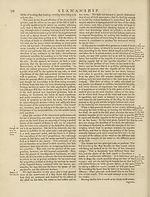Encyclopaedia Britannica, or, a Dictionary of arts, sciences, and miscellaneous literature : enlarged and improved. Illustrated with nearly six hundred engravings > Volume 19, Scripture-SUG
(83) Page 75
Download files
Complete book:
Individual page:
Thumbnail gallery: Grid view | List view

75
SEAMANSHIP.
tlon, trrey cannot arrange tlreir thoughts ; they can
hardly be faid to think. They can far lefs exprefs or
communicate to others the intuitive knowledge which
they poffefe ; and their art, acquired by habit alone, is
little different from an inftinft. We are as little in-
titled to expedt improvement here as in the architec¬
ture of the bee or the beaver. The fpecies (pardon
the allulion, ye generous hearts of oak) cannot improve.
Yet a Ihip is a machine. We know the forces which
•atf on it, and we knoxv the refults of its conltruclion—
all thefe are as fixed as the laws of motion. What hin¬
ders this to be reduced to a fet of pra&ieal maxims,. as
well founded and as logically deduced as the working
of a iteam engine or a cotton mill. ’I he ftoker or the
fpinner a£ls only with his hands, and may u whiftle as
he works, for want of thought 5” but the mechanic, the
•engineer, thinks for him, improves his machine, and di¬
rects him to a better pra£tice. May not the rough Tea¬
man look for the fame affiltance j and may not the inge¬
nious fpeculatift in his clofet unravel the intricate thread
of mechanifm which connects all the manual operations
with the unchangeable laws of nature, and both furnith
the fcaman with a better machine and direct him to a
more dexterous ufe of it ?
which has We cannot help thinking that much may be done •,
been zeal- nay, we may fay that much has been done. We think
oufly culti- highly of the progreflive labours of Renaud, Pitot, Bou-
vated by guer, Du Hamel, Groignard, Bernoulli, Euler, Komme,
phi'Ao-1 ancl others ; and are both furprifed and forry that Bri-
phers. tain has contributed fo little in thefe attempts. Gor¬
don is the only one of our countrymen who has given a
profeffedly fcientific treatife on a fmall branch of the
fubje£t. The government of France has always been
itrongly impreffed with the notion of great improve¬
ments being attained by fyftematic ftudy of this art j
and we are indebted to the endeavours of that ingenious
nation for any thing of praftical importance that has
been obtained. M. Bouguer was profeffor of hydro¬
logy at one of the marine academies of France, and
was enjoined, as part of his duty, to compofe differta-
tions both on the conftru&ion and the working of (hips.
His Traite du Navire, and his Manoeuvre des VaiJJeaux,
are undoubtedly very valuable performances: So are
thofe of Euler and Bernoulli, confidered as mathemati¬
cal differtations, and they are wonderful works of ge¬
nius, confidered as the productions of perfons who hard¬
ly ever faw a ihip, and were totally unacquainted with
the profeflion of a feaman. In this refped Bouguer had
great fuperiority, having always lived at a fea-port,
and having made many very long voyages. His trea-
tifes therefore are infinitely better accommodated to the
demands of the feamen, and more directly inftruftive ;
but ftill the author is more a mathematician than an ar-
tift, and his performance is intelligible only to mathe¬
maticians. It is true, the academical education of the
young gentlemen of the French navy is fuch, that a
great number of them may acquire the preparatory
knowledge that is neceffary •, and we are well informed
that, in this refpeft, the officers of the Britiffi navy are
greatly inferior to them.
Argument But this very circumftance has furnilhed to many
againft the perfons an argument againft the utility of thofe per-
utihty of formances. It is faid, “ that notwithftanding this fu-
formanTes Per*or mathematical education, and the poffeffion of
’ thofe boafted performances of M. Bouguer, the French
are greatly inferior, in. point of feamanffiip, to our coun¬
trymen, who have not a page in their language to in-
flruft them, and who could not perufe it if they had it.’*
Nay, fo little do the Frencli themfelves feem fenfible of
the advantage of thefe publications, that no pcrfon a-
mong them has attempted to make a familiar abridge¬
ment of them, written in a way fitted to attraft atten¬
tion- •, and they ftill remain neglected in their original
ab ft rule and uninterefting form.
We wiffi that we could give a fatisfaflory anfwer to
this obfervation. It is-juft, and it is important. Thefe
very ingenious and learned differtations are by no means
fo ufeful as we thould expedh They are large books.,
and appear to contain much and as their plan is logical,
it feems to occupy the whole fubjeift, and therefore to
have done almoft all that can be done. But, alas! they
have only opened the fubjett, and the ftudy is yet in its
infancy. The whole fcience of the art muft proceed
on the knowledge of the impulfions of the wind and
water. Thefe are the forces which aft on the machine ^
and its motions, xvbich are the ultimatum of our re-
fearch, whether as an end to be obtained or as a thing
to be prevented, muft depend on thefe forces. Now it
is with refpeft to this fundamental point that we are as $
yet almoft totally in the dark. And in the perform-which are
ances of M. Bouguer, as alfo in thofe of the other au- cor/cflcdly
thors we have named, the theory of thefe forces, by ^r™tePus
which their quantity and the direflion of the ir action fun^amen.
are afeertained, is altogether erroneous •, and its refults tal princi-
deviate fo enormoufty from what is obferved in the mo-p^es;
tions of a (hip, that the perfon who ftiould direff the
operations on fliipboard, in conformity to the maxims
dedueible from M. Bouguer’s propofitions, would be
baffled in moft of his attempts, and be in danger of
lofing the ftiip. The whole proceeds on the fuppofed
truth of that theory which ftates the impulfe of a fluid
to be in the proportion of the fquare of the fine of the
angle of incidence •, and that its aflion on any fmall
portion, fuch as a fquare foot of the fails or hull, is the
fame as if that portion were detached from the reft, and
were expofed fingle and alone, to the wind or water in
the fame angle. But we have fhown, in the article
Resistance of Fluids, both from theory and experi¬
ence, that both of thefe principles are erroneous, and
this to a very great degree, in cafes which occur moll
frequently in pra&ice, that is, in the fmall angles of in ¬
clination. When the wind falls nearly perpendicular on
the fails, theory is not very erroneous : but in thefe
cafes, the circumitances of the {hip’s fituation are gene¬
rally fuch that the practice is eafy, occurring almoft
without thought •, and in this cafe, too, even confider-
able deviations from the very bell pradlice are of no
great moment. The interefting cafes, where the in¬
tended movement requires or depends upon very oblique
actions of the wind on the fails, and its prafticability or
impra£licability depends on a very fmall variation of
this obliquity *, a miftake of the force, either as to in-
tenfity or dire£lion, produces a mighty effedt on the re-
fulting motion. This is the cafe in lailing to w indward *,
the moll important of all the general problems of fea-
manlhip. The trim of the fails, and the courfe of the
Ihip, fo as to gain moil on the wind, are very nice
things that is, they are confined within very narrow
limits, and a fmall millake produces a very confiderable
effe6l. The fame thing obtains in many of the nice pro-
K 2 blems
SEAMANSHIP.
tlon, trrey cannot arrange tlreir thoughts ; they can
hardly be faid to think. They can far lefs exprefs or
communicate to others the intuitive knowledge which
they poffefe ; and their art, acquired by habit alone, is
little different from an inftinft. We are as little in-
titled to expedt improvement here as in the architec¬
ture of the bee or the beaver. The fpecies (pardon
the allulion, ye generous hearts of oak) cannot improve.
Yet a Ihip is a machine. We know the forces which
•atf on it, and we knoxv the refults of its conltruclion—
all thefe are as fixed as the laws of motion. What hin¬
ders this to be reduced to a fet of pra&ieal maxims,. as
well founded and as logically deduced as the working
of a iteam engine or a cotton mill. ’I he ftoker or the
fpinner a£ls only with his hands, and may u whiftle as
he works, for want of thought 5” but the mechanic, the
•engineer, thinks for him, improves his machine, and di¬
rects him to a better pra£tice. May not the rough Tea¬
man look for the fame affiltance j and may not the inge¬
nious fpeculatift in his clofet unravel the intricate thread
of mechanifm which connects all the manual operations
with the unchangeable laws of nature, and both furnith
the fcaman with a better machine and direct him to a
more dexterous ufe of it ?
which has We cannot help thinking that much may be done •,
been zeal- nay, we may fay that much has been done. We think
oufly culti- highly of the progreflive labours of Renaud, Pitot, Bou-
vated by guer, Du Hamel, Groignard, Bernoulli, Euler, Komme,
phi'Ao-1 ancl others ; and are both furprifed and forry that Bri-
phers. tain has contributed fo little in thefe attempts. Gor¬
don is the only one of our countrymen who has given a
profeffedly fcientific treatife on a fmall branch of the
fubje£t. The government of France has always been
itrongly impreffed with the notion of great improve¬
ments being attained by fyftematic ftudy of this art j
and we are indebted to the endeavours of that ingenious
nation for any thing of praftical importance that has
been obtained. M. Bouguer was profeffor of hydro¬
logy at one of the marine academies of France, and
was enjoined, as part of his duty, to compofe differta-
tions both on the conftru&ion and the working of (hips.
His Traite du Navire, and his Manoeuvre des VaiJJeaux,
are undoubtedly very valuable performances: So are
thofe of Euler and Bernoulli, confidered as mathemati¬
cal differtations, and they are wonderful works of ge¬
nius, confidered as the productions of perfons who hard¬
ly ever faw a ihip, and were totally unacquainted with
the profeflion of a feaman. In this refped Bouguer had
great fuperiority, having always lived at a fea-port,
and having made many very long voyages. His trea-
tifes therefore are infinitely better accommodated to the
demands of the feamen, and more directly inftruftive ;
but ftill the author is more a mathematician than an ar-
tift, and his performance is intelligible only to mathe¬
maticians. It is true, the academical education of the
young gentlemen of the French navy is fuch, that a
great number of them may acquire the preparatory
knowledge that is neceffary •, and we are well informed
that, in this refpeft, the officers of the Britiffi navy are
greatly inferior to them.
Argument But this very circumftance has furnilhed to many
againft the perfons an argument againft the utility of thofe per-
utihty of formances. It is faid, “ that notwithftanding this fu-
formanTes Per*or mathematical education, and the poffeffion of
’ thofe boafted performances of M. Bouguer, the French
are greatly inferior, in. point of feamanffiip, to our coun¬
trymen, who have not a page in their language to in-
flruft them, and who could not perufe it if they had it.’*
Nay, fo little do the Frencli themfelves feem fenfible of
the advantage of thefe publications, that no pcrfon a-
mong them has attempted to make a familiar abridge¬
ment of them, written in a way fitted to attraft atten¬
tion- •, and they ftill remain neglected in their original
ab ft rule and uninterefting form.
We wiffi that we could give a fatisfaflory anfwer to
this obfervation. It is-juft, and it is important. Thefe
very ingenious and learned differtations are by no means
fo ufeful as we thould expedh They are large books.,
and appear to contain much and as their plan is logical,
it feems to occupy the whole fubjeift, and therefore to
have done almoft all that can be done. But, alas! they
have only opened the fubjett, and the ftudy is yet in its
infancy. The whole fcience of the art muft proceed
on the knowledge of the impulfions of the wind and
water. Thefe are the forces which aft on the machine ^
and its motions, xvbich are the ultimatum of our re-
fearch, whether as an end to be obtained or as a thing
to be prevented, muft depend on thefe forces. Now it
is with refpeft to this fundamental point that we are as $
yet almoft totally in the dark. And in the perform-which are
ances of M. Bouguer, as alfo in thofe of the other au- cor/cflcdly
thors we have named, the theory of thefe forces, by ^r™tePus
which their quantity and the direflion of the ir action fun^amen.
are afeertained, is altogether erroneous •, and its refults tal princi-
deviate fo enormoufty from what is obferved in the mo-p^es;
tions of a (hip, that the perfon who ftiould direff the
operations on fliipboard, in conformity to the maxims
dedueible from M. Bouguer’s propofitions, would be
baffled in moft of his attempts, and be in danger of
lofing the ftiip. The whole proceeds on the fuppofed
truth of that theory which ftates the impulfe of a fluid
to be in the proportion of the fquare of the fine of the
angle of incidence •, and that its aflion on any fmall
portion, fuch as a fquare foot of the fails or hull, is the
fame as if that portion were detached from the reft, and
were expofed fingle and alone, to the wind or water in
the fame angle. But we have fhown, in the article
Resistance of Fluids, both from theory and experi¬
ence, that both of thefe principles are erroneous, and
this to a very great degree, in cafes which occur moll
frequently in pra&ice, that is, in the fmall angles of in ¬
clination. When the wind falls nearly perpendicular on
the fails, theory is not very erroneous : but in thefe
cafes, the circumitances of the {hip’s fituation are gene¬
rally fuch that the practice is eafy, occurring almoft
without thought •, and in this cafe, too, even confider-
able deviations from the very bell pradlice are of no
great moment. The interefting cafes, where the in¬
tended movement requires or depends upon very oblique
actions of the wind on the fails, and its prafticability or
impra£licability depends on a very fmall variation of
this obliquity *, a miftake of the force, either as to in-
tenfity or dire£lion, produces a mighty effedt on the re-
fulting motion. This is the cafe in lailing to w indward *,
the moll important of all the general problems of fea-
manlhip. The trim of the fails, and the courfe of the
Ihip, fo as to gain moil on the wind, are very nice
things that is, they are confined within very narrow
limits, and a fmall millake produces a very confiderable
effe6l. The fame thing obtains in many of the nice pro-
K 2 blems
Set display mode to:
![]() Universal Viewer |
Universal Viewer | ![]() Mirador |
Large image | Transcription
Mirador |
Large image | Transcription
Images and transcriptions on this page, including medium image downloads, may be used under the Creative Commons Attribution 4.0 International Licence unless otherwise stated. ![]()
| Permanent URL | https://digital.nls.uk/192696361 |
|---|
| Attribution and copyright: |
|
|---|
| Description | Ten editions of 'Encyclopaedia Britannica', issued from 1768-1903, in 231 volumes. Originally issued in 100 weekly parts (3 volumes) between 1768 and 1771 by publishers: Colin Macfarquhar and Andrew Bell (Edinburgh); editor: William Smellie: engraver: Andrew Bell. Expanded editions in the 19th century featured more volumes and contributions from leading experts in their fields. Managed and published in Edinburgh up to the 9th edition (25 volumes, from 1875-1889); the 10th edition (1902-1903) re-issued the 9th edition, with 11 supplementary volumes. |
|---|---|
| Additional NLS resources: |
|

